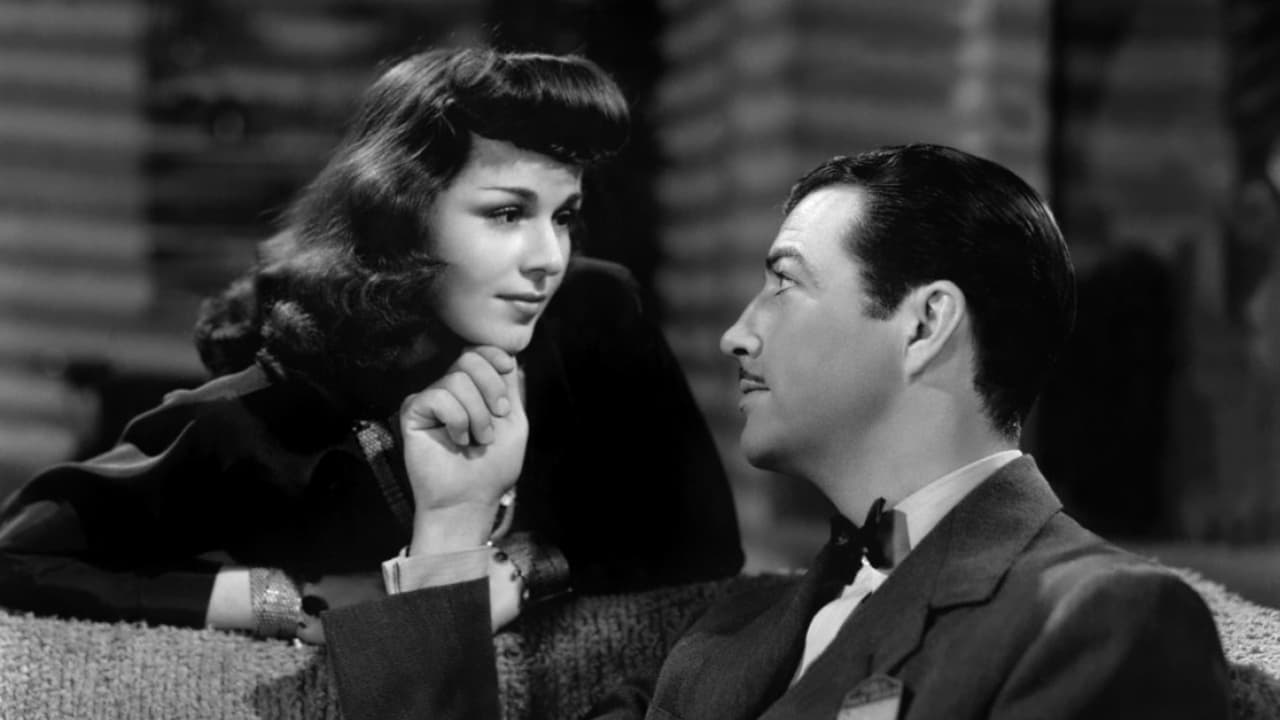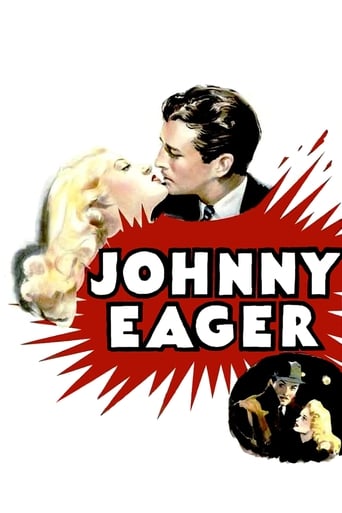

Tied for the best movie I have ever seen
... View MoreGood start, but then it gets ruined
... View MoreJust intense enough to provide a much-needed diversion, just lightweight enough to make you forget about it soon after it’s over. It’s not exactly “good,” per se, but it does what it sets out to do in terms of putting us on edge, which makes it … successful?
... View MoreThis movie tries so hard to be funny, yet it falls flat every time. Just another example of recycled ideas repackaged with women in an attempt to appeal to a certain audience.
... View MoreThis is a pretty good gangster film from MGM, but it certainly doesn't qualify as classic film noir and fans of that genre will be disappointed. There are some noir elements (crime drama, set in big city, a merry band of criminals) but the critical elements are missing. Taylor (who does a good job trying to make viewers forget about "Camille" and "Magnificent Obsession") doesn't fit the profile of the man lured by his own greed or bad judgment into the underworld, nor is he lured and betrayed by a femme fatale. On a more superficial level, there are no rainy scenes nor does the camera work have those shadows and unusual angles we come to associate with film noir Put aside the idea that you're watching film nor and it's an enjoyable film, though a bit too long for my tastes.
... View MoreA fabulous cast, a brilliant screenplay, and a truly dynamic pairing really create TNT here, Taylor and Turner as beautiful a couple as could possibly be on screen during the golden age of cinema. Even in spite of their age difference, Robert and Lana spark,e and this is a single pairing that even outdid Lana's four films with that dear Mr. Gable. Robert Taylor is a parolee, and she is the daughter of one of the prosecutors (Edward Arnold) who sent him up the river. Taylor is obviously not done with the shady life, and Arnold is out to expose the corruption involving Taylor and a dog track he is preparing to open while living the seemingly honest life of a cab driver.Van Heflin deservedly won the Oscar as the drunken philosopher who is the heart and soul of the film, dying inside due to his consumption, but still filled with the truth of life in spite of that addiction. You get the impression that this idealistic drunkard imbibes because he is disgusted with a world that is beyond his comprehension. In fact, the drunker he is, the more in tuned with his wisdom he is, showing how deceptive alcohol can be when it makes you open your eyes metaphysically while closing them physically.There's a great supporting cast with characters who sparkle with cynicism and hardness. Taylor's young niece is all young lady on the surface, suddenly exploding in rough talk out of nowhere. The character of Turner's fellow sociology student partner is also amusing as she constantly keeps inserting her foot into her mouth. Former Warner Brothers "B" star Glenda Farrell has a cameo as an old acquaintance of Taylor's whose desire for help from him has an ironic connection with the finale. Patricia Dane, as Taylor's obvious mistress hysterically mispronounces "Herod Agrippa" and does not remotely display a "heart of gold" underneath film characters like this usually later reveal.Edward Arnold also is winning as Turner's father who finds himself the victim of blackmail thanks to a vicious game Taylor uses her in, showing a disgust with both Taylor and himself as he goes against his own moral code to protect his daughter. Ultimately, the film surrounds the heat between Taylor and Turner which explodes in a scene where Turner falsely believes herself to have impulsively committed murder. This is a speedy film that is a preliminary to the growing genre of film noir, not as dark as those to follow within two years,but utilizing the same types of camera shots and tough dialog that was on the verge of taking over the screen. The fact that pretty people are not leaving a really pretty situation makes this noir enough for me, and one that remains a classic to this day.
... View MoreHandsome, quick on his feet and quicker on the draw gangster Johnny Eager (Taylor) meets the hottest-of-hot young Hollywood dames, Lana Turner, here the District Attorney's daughter. Johnny needs a betting licence from the D.A. but with Johnny's record it ain't gonna happen. As always Johnny's got an angle - this time it ain't pretty at all. But has Johnny run into an acquaintance he ain't seen for a long long while: his conscience? Or is it just his pal (Van Heflin) who's started yapping like some bible-puncher making him on edge? Johnny slugs him to shut him up but his pal still wont stop yapping. Or is it his conscience that's screwing things up? Maybe he just ain't got one? Maybe.This movie motors like a hot rod with the pedal to the metal - with three people doing the steering! It sure is going fast but for sure it ain't going far. Johnny's had his crashes before but this time is different. This time there ain't gonna be too many survivors.Robert Taylor and Lana Turner were never better - they were both young and hot and riding in this souped-up racer of a movie. Yet oddly it was Van Heflin who got the Oscar for his role as the drunken, maudlin muttering voice of conscience, a role he was to make his own and reprised from then on. Clearly, the studio understood that the public of the day was not ready for a raw amoral sociopath as a hero and needed the authorial moral commentary that the Van Heflin character provided to licence their lascivious enjoyment. Today the Van Heflin character appears so insufferable that the public would instead be more likely to be willing Johnny to shoot him - and it would have been Robert Taylor who received the Oscar.
... View MoreIf this film hadn't been made at MGM, it probably would be considered a good example of Film Noir. However, given that the film is very polished, has somewhat less dark dialog, features big-name actors and is rather pretty to look at, I would consider this almost like "Film Noir-Lite". This isn't necessarily a complaint--it is a good film. However, the film just doesn't have that grittiness to it you'd expect for the genre--though all the actors in it did a very good job.The film stars Robert Taylor as the mobster "Johnny"--quite a departure from his 1930s "pretty boy" image. Here, he pretends to be a parolee going straight, but he's still in charge of the local mob and everyone but Taylor's dim-witted parole officer can see this. The man especially aware of just how dirty Taylor is happens to be the father (Edward Arnold) of the girl (Lana Turner) Taylor is pursuing. He's the district attorney who hates Taylor and yet is powerless to stop his impetuous girl from throwing her life away on the mug. Why she loves Taylor is a bit hard to follow. Sure, he's very handsome and charming, but he's also extremely selfish and just plain bad! Johnny is usually accompanied by either Van Heflin, as his alcoholic and well-educated sidekick, or Paul Stewart, who oddly plays a Hispanic! Stewart made a long career out of playing mobsters and why they insisted on sticking this bizarre accent on him is beyond me--he's plenty interesting and menacing already.There are many, many twists and turns in the film--too many to discuss here. However, and important one is a sleazy set-up where Johnny convinces his girl that she killed someone in order to give him something with which to blackmail her father!! This and his subsequent actions serve to convince Heflin and the audience that Johnny has no soul--though late in the film he comes to actually feel guilt for destroying Lana and he makes amends in a very rousing and violent finale.As I said, the acting was extremely good as was the dialog. About the only negatives were the silly accent by Stewart and the somewhat convoluted and overly complicated plot. Still, it's a very good flick and one that old film buffs will enjoy.
... View More